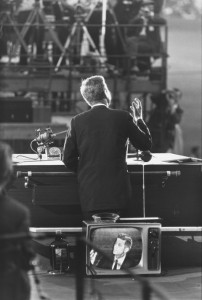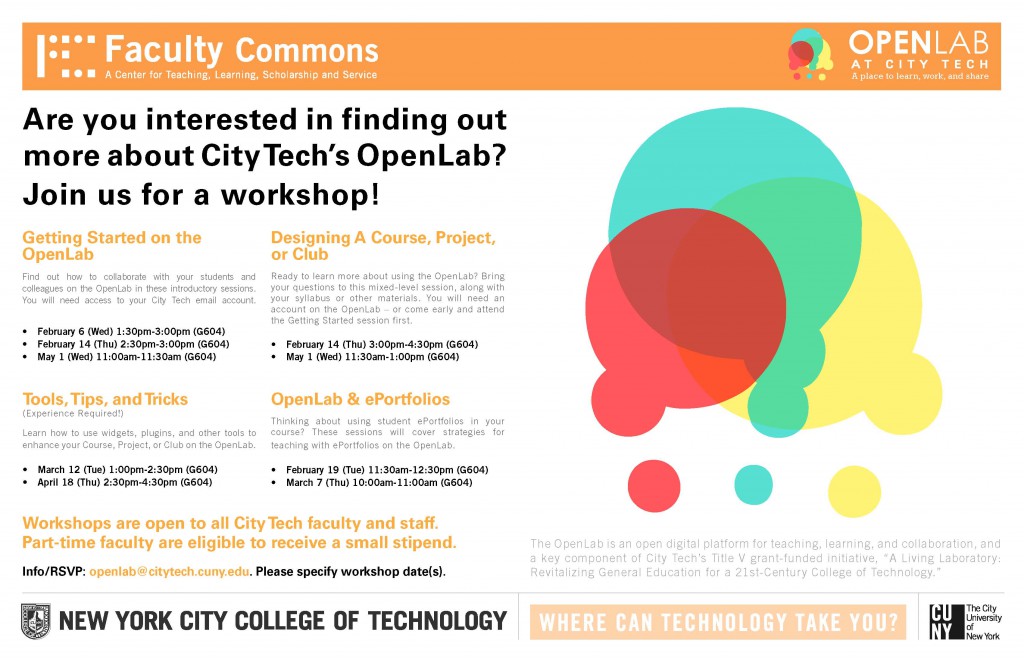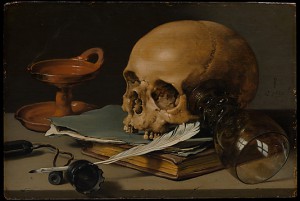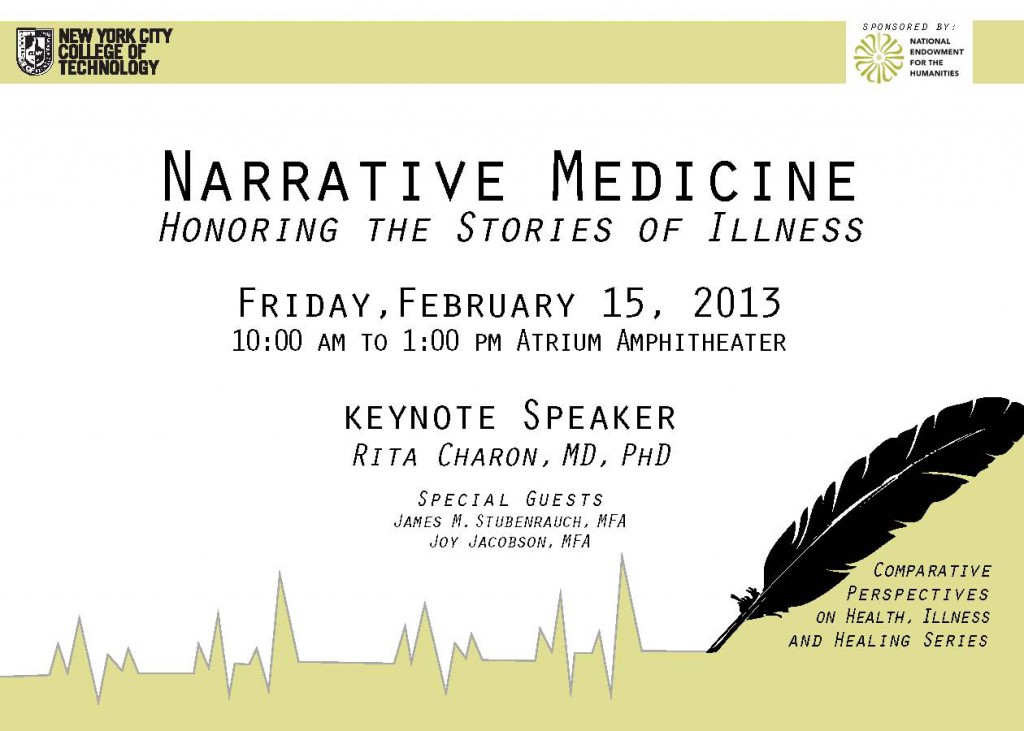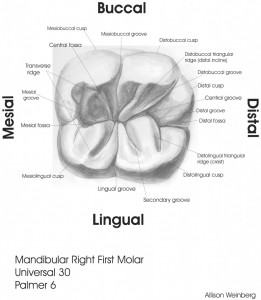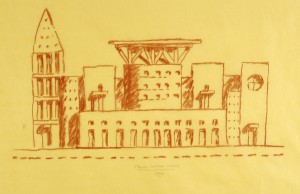Professor Justin Davis’ class SPE 1330 Effective Speaking makes use of videos for students to better “see” the performance of public speaking. Students are videotaped in class and asked to review and evaluate their own speeches outside of class. Recordings of student speeches are made available on the class website on the OpenLab, which is loaded with videos of sample speeches that help illustrate differences between persuasive and informative speaking. Alongside student examples of public speaking, Professor Davis also includes links to Presidential speeches. Students are even asked to judge a speech contest virtually by viewing videos of the contestants online and evaluating the speeches for an assignment.
Spring 2013 OpenLab Workshops for Faculty
Want to get started on the OpenLab, create an ePortfolio, or figure out a nifty new trick for your website? Look at this Spring semester’s workshops for Faculty. All workshops take place in G604. Download the Spring schedule here.
Mary Sue Donsky: Sketching for the Study of Estates, Wills, and Trusts
Professor Mary Sue Donsky schedules field trips to art museums for students in her LAW 2301 Estates, Wills, and Trusts course. On one recent trip to the Metropolitan Museum of Art, she gave students a tour “Honoring Decedents in Art Across Time and Cultures” that used artifacts from the museum’s collection to highlight funerary-related traditions through history. What’s a decedent? For those unfamiliar with legal lingo, a decedent is a deceased person, a term used mainly in law. During the field trip students were asked to sketch art that honors decedents such as grave markers or ancestor figures, or other examples of related artifacts, including sarcophagi, urns, and reliquaries. Following the trip, students visited museum websites all over the world to “collect” objects for a class blog. Professor Donsky effectively uses the skill of drawing to communicate the historical dimensions of the course. Giving students the opportunity to sketch is a unique way to reinforce and broaden lessons learned in the class room, and suggests that perhaps we should consider drawing to be a Gen Ed skill.
Narrative Medicine Pioneer, Rita Charon, Speaks at City Tech
Dr. Rita Charon, Director of the Program in Narrative Medicine at Columbia University’s College of Physicians and Surgeons will speak at City Tech on Friday, February 15, 2013 at 11 am in the Atrium Amphitheater. Charon’s advancement of narrative competency for health professionals has had significant impact on medical education in the U.S. Following Charon’s lecture is a discussion led by James Stubenrauch and Joy Jacobson on narrative writing and nursing practice
Daniel Alter: Aesthetics and Dentistry
How do you directly address General Education objectives in a course on Tooth Morphology for a program in Restorative Dentistry? Professor Daniel Alter came up with creative means to overcome this conundrum by using the OpenLab to increase student participation and by assigning an interesting paper assignment.
Professor Alter’s class website is filled with handouts, videos, links to his powerpoint lectures, as well as instructions. In his paper assignment, students were asked to consider the perceptions of beauty in dental practice across diverse cultures. Students uploaded abstracts of their paper to the class site. Their introductions reflect the diverse level of cultural engagement with dental practice from Bali to Japan and South Africa. You can read examples of his students’ research here.
Libby Clarke: Team Work in Web Analytics
An Example of a Collaborative Project in Professor Libby Clarke’s Web Analytics Course ADV3561
Team Project: SEO/SEM Makeover
You will be split up into teams. Each team member will search out and propose a prospective client for an SEO/SEM makeover. Once the team has chosen the final client choice, that client will be interviewed to ascertain his/her SEO/SEM needs. The team will then prepare and present a proposed plan of action to the class for critique. The final report will then be submitted to the client.
Description:
In order to help the students learn how they will have to function as a team member. The class made suggestions to their teams and voted on a final client. This person had to have a live website online, and needed to be willing to have the students go over it and make our suggestions. They also needed to be available to be interviewed in person, by phone, or by email the week of the 15th of October.
Matthew Gold: Is Drawing a Gen Ed Skill?
Some would argue that drawing is as important a skill as reading, writing, speaking, and thinking. In Professor Matthew Gold’s English Composition class Composing Abstractions, students discussed the status of drawing in an assignment. After reading Michael Graves’ “Architecture and the Lost Art of Drawing,” students were asked to summarize the key points and reflect on their reading.
In assignments that took place in the classroom or at home , students were asked to think about architecture in a variety of ways, from “unphotographable moments” or through the lens of an adjective, i.e., “smooth” or “slimy.” Working in groups, students re-imagined and re-invented the Brooklyn skyline. See an example of “futuristic dreams” here.
Alex Aptekar: Student Projects in Building Technology
 Professor Alexander Aptekar offers two advanced-level courses in Building Technology for the Department of Architectural Technology. Both courses share one class website that is filled with readings, instructions, and video tutorials. Since assignments for both courses are posted, students can see what is expected of them in the following sequence of the course. Assignments range from early ‘scavenger hunt’ type exercises to more complex projects late in the semester. Moreover, the class website offers the opportunity for students to showcase their work. For example, see a student’s project for an assignment that evaluated the student’s understanding a structure grid, levels, and framing plan.
Professor Alexander Aptekar offers two advanced-level courses in Building Technology for the Department of Architectural Technology. Both courses share one class website that is filled with readings, instructions, and video tutorials. Since assignments for both courses are posted, students can see what is expected of them in the following sequence of the course. Assignments range from early ‘scavenger hunt’ type exercises to more complex projects late in the semester. Moreover, the class website offers the opportunity for students to showcase their work. For example, see a student’s project for an assignment that evaluated the student’s understanding a structure grid, levels, and framing plan.
Call for Second Year Associate Fellows
A Living Laboratory: Revitalizing General Education for a 21st-Century College of Technology
GENERAL EDUCATION SEMINAR – ASSOCIATE FELLOWS PROGRAM — Spring 2013
UPDATE: Many thanks for your interest! The application period has now closed. If you completed an application we will be in touch soon with more details about the program.
About The Living Lab
“A Living Laboratory: Revitalizing General Education for a 21st-Century College of Technology” is a five-year initiative (2010-2015) funded by the U.S. Department of Education’s Strengthening Hispanic-Serving Institutions (Title V) program. Its mission is to re-envision General Education at City Tech as a “living laboratory,” using City Tech’s signature strengths: hands-on experiential models of learning and our vibrant Brooklyn Waterfront location.
The “Living Lab” grant has four interrelated activities:
1) The General Education Seminar: brings together diverse groups of Faculty Fellows to revitalize General Education through place-based learning and high-impact educational practices;
2) The OpenLab (https://openlab.citytech.cuny.edu): creates an innovative digital platform to support open teaching and learning at City Tech, and enhance the intellectual and social fabric of the college community;
3) A Culture of Assessment: integrates comprehensive outcomes assessment into the Gen Ed curriculum;
4) The Brooklyn Waterfront Research Center: builds an endowment to support student and faculty research at this newly-created City Tech institution.
Join the “Living Lab” General Education Seminar
We are currently seeking full-time and part-time faculty members to join the General Education Seminar Associate Fellows Program in Spring 2013. As an Associate Fellow you will become part of the growing interdisciplinary community at City Tech that is enthusiastically engaged in this transformational effort.
Fellows in the General Education Seminar commit to exploring innovative pedagogical approaches and incorporating what they have learned into their courses. Among the questions seminar participants consider are these:
– What changes can we make to the student experience that will not just prepare our students to succeed at City Tech, but also support creative, original, and critical thinking through the use of high-impact educational practices?
– How can we use one of City Tech’s greatest assets — its location within the “living laboratory” of the downtown Brooklyn waterfront — to create hands-on, place-based learning opportunities with our students?
– How can we use the City Tech OpenLab, an open-source digital platform, to customize learning experiences for our students that will engage them in the intellectual fabric of our College and make their achievements visible to our own community and to the wider public?
The Associate Fellows Program
Associate Fellows – who may be part-time or full-time faculty members – will participate in four workshops during the Spring 2013 semester that focus on General Education and the following: High-Impact Educational Practices, Place-Based Learning, Assessment, and working with the City Tech OpenLab, our new open digital platform for teaching and learning.
Associate Fellows will be mentored by full-time Gen Ed Seminar Fellows, who are responsible for sharing what they’ve learned, with the goal of disseminating the Seminar findings to the entire faculty community.
Eligibility
– both full-time and part-time faculty are eligible;
– available on Fridays in Spring 2013 semester to participate in four workshops (dates TBD);
– willing to work in a highly collaborative environment;
– willing to use the OpenLab (https://openlab.citytech.cuny.edu) for seminar-related activities and teaching
(training and support will be provided);
– willing to implement what you have learned in your classroom and on the OpenLab in Fall 2013.
Compensation
Work done as part of this project is vital service to the College. Active participation by full-time faculty is recognized as service to the College; part-time faculty will receive a stipend of $480 ($120 per workshop attended).
Application
UPDATE: Many thanks for your interest! The application period has now closed. If you completed an application we will be in touch soon with more details about the program.
Application Deadline
1pm, Tuesday, December 4, 2012
Further Information
Please contact Living Lab General Education Seminar Co-Directors Karen Goodlad at kgoodlad@citytech.cuny.edu or Jonas Reitz at jreitz@citytech.cuny.edu if you have questions or need additional information.
Living Lab at 10th Annual Poster Session Thursday Nov 15
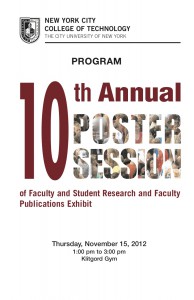 Come out to support faculty and student research at City Tech’s 10th Annual Poster Session, Thursday, Nov 15, 1-3 pm in Klitgord Gym.
Come out to support faculty and student research at City Tech’s 10th Annual Poster Session, Thursday, Nov 15, 1-3 pm in Klitgord Gym.
The Living Lab will have posters in the Education section. Living Lab Fellows Karen Goodlad, Jonas Reitz, Richard Hanley, Anne Leonard, Sandra Cheng, Urmi Ghosh-Dastidar, Elaine Leinung, Barbara Mishara, and Zoya Vinokur will participate in a display on “A Living Lab: Faculty Fellows Incorporating Place Based Learning and High Impact Educational Practices at City Tech;” Ralph Alcendor, Marie Montes-Matias, and Diana Samaroo have a display on “Transforming Undergraduate Laboratory Experiences in Science Through the Title V Living Lab Project;” and Jody Rosen, Jenna Spevack, Maura Smale, and Charlie Edwards will present a poster on “Connecting and Collaborating on the OpenLab.”
Take a look at the poster session program here.

